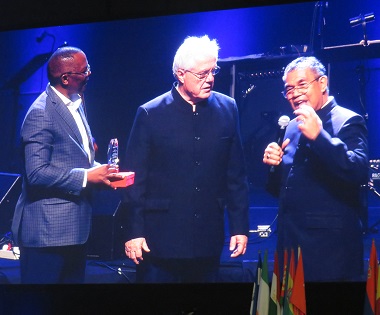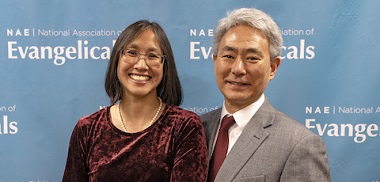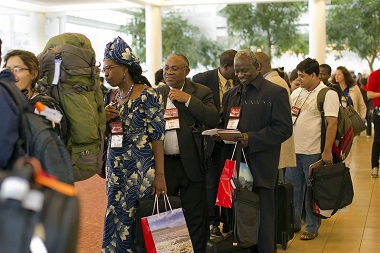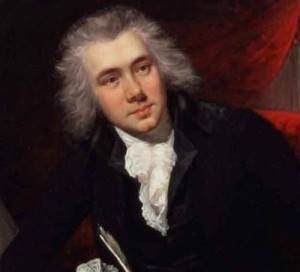
Brian Stiller with Goodwill Shana, president of the Association of Evangelicals in Africa, and Efraim Tendero, general secretary of the WEA, at the November 2019 General Assembly in Jakarta.
Brian Stiller is Global Ambassador for the World Evangelical Alliance.
Now that Donald Trump has left the White House, how should evangelicals outside the United States of America view this experience – and what counsel might they be able to offer their American brothers and sisters?
Many non-Americans ask for my view on what has been transpiring recently in the US. Here are some thoughts.
In my role as global ambassador for the World Evangelical Alliance (WEA), as I attempt to explain the United States to others, a number of factors help in my understanding of Americans and, more importantly, American evangelicals.
Power corrupts
For the last four years, too many American evangelicals have been caught up in passionate contests about the use of raw political power. This has embarrassed many of us and confused others. Never before have I heard so many people say that they either avoid or despise evangelicals.
There have been bizarre debates, sometimes pitting evangelical leaders against each other. Some self-proclaimed prophets even declared that God’s anointing was on President Trump; they predicted that he would win a second term as if this was a word from the Lord.
Unique heritage
To understand where American evangelicals are today, it is helpful to look at their heritage. The United States of America was founded amidst historic aspirations towards freedom, a founding myth that 20th century leaders traced to John Winthrop’s famous statement that they were “a city set upon a hill for all to observe.”
This powerful religious vision, filtered through the dynamism imparted by mass migration and vast resources, implanted in American rhetoric and ethos a sense that their land had special divine promise and design.
The fact that the United States has been predominantly Christian from its beginning has powerfully reinforced this belief. Even in an age of increased secularization, it still enjoys strong denominations and has many megachurches.
After World War II, the influence of the American South spread throughout the nation as many evangelicals moved away from that region. White evangelicals moved mostly to the West and Southwest, Black evangelicals mostly to the North as well as the West.
Not all white

Regent College grad Walter Kim (with his wife Toni} is president of the National Association of Evangelicals in the U.S.
And here is another major point of confusion. Pundits often speak of ‘evangelicals’ as if they simply equal ‘white evangelicals.’
But there are many African Americans, Hispanic Americans, Asian Americans and Native Americans who share evangelical beliefs and practices, but not the political loyalties of white evangelicals.
This sort of background information assists my non-American friends to understand the power and innovative skill of the American national persona, the unmatched creativity and productivity of Americans, and their unvarnished generosity and desire to be a force of good in the world.
In the wake of a discredited president to whom a remarkable number of (though far from all) white evangelicals gave support, what are we evangelicals in the rest of the world to do?
Divided by politics
American politics divides into two primary sides – the Republican Party or the Democratic Party. In recent decades adherence to these parties has become much more important for defining social, cultural and religious convictions. (A generation ago, maybe 15 percent in each party ‘hated’ or gravely distrusted members of the other party. Now it is way over 50 percent.),
From the start of Trump’s rise to power, while a determined and loyal rank-and-file of white evangelicals latched on to Trump’s populism, other evangelical leaders were profoundly concerned and attempted to warn America.
A number (seemingly too few) of highly visible pastors, educators and agency leaders were vocal in protesting that people were putting too much stock in one man. They critiqued those who attributed prophetic greatness to the president or the belief that he was under a divine call. They also warned against giving loyalty to any political party, political platform or political leader a higher priority than loyalty to Christ.
Look to Global South

Delegates arriving at the World Evangelical Alliance General Assembly at Jakarta in November 2019.
Today, America is a wounded country. Many evangelicals express embarrassment for their unguarded support; others continue to be angry that their candidate didn’t win. A large minority of Americans in general (including evangelicals) now have a profound distrust in their governmental institutions.
Second, because America is such a global cultural force and its role in evangelical expansion has been so influential, it is easy to overlook the fact that the real growth among evangelicals recently has been in the Global South.
Although the current malaise among American evangelicals will inevitably influence us all, there is a strong tendency for the media to assume that a trend in the US is the same elsewhere.
America isn’t the world
But the United States is not the world. In a Christian community of 600 million evangelicals, Americans don’t define who we are or should be for the rest of the world.
As the term ‘evangelical’ has become mixed up with all sorts of political groups, views, political pressure and personalities, evangelicals elsewhere in the world should insist that Christian belief and Christian practice deserve first place. Evangelicals elsewhere should not be looking to recent American history for what it means to “be in the world, but not of the world.”
Time for a name change?
A nagging question coming out of the Trumpian mobilization, however, relates to the ‘brand’ value of the name. Should we replace the name ‘evangelical?’
Arguments in the affirmative say that the term lacks definition, that it has been coopted by political debate and that it is now a term driving some away from the Gospel. Others, given this American debacle, feel that the name has been simply emptied of its usefulness.
Consider history, the world

William Wilberforce had two main goals: the abolition of slavery and the reform of morals.
I disagree. First, it’s a biblical name. The word euangelion, or ‘Evangel,’ meaning ‘the good news,’ has been used for centuries, particularly for the followers of Martin Luther and then more broadly at the time of William Wilberforce.
Today, in many parts of the world, it remains an important means of identity. For example, if you are in a Muslim or Hindu majority country, and you are not Roman Catholic or liberal Protestant, what name do you use?
As a threatened minority, the ability to identify with over 600 million fellow evangelical Christians provides shelter in identity and bonding in fellowship. As a friend noted, every time a priest takes a misstep, do Roman Catholics wonder about a name change?
Finally, to my evangelical friends in the rest of the world, let’s not be naïve about the temptation that we too might get caught using our church base and witness to gain political power. We have seen this happen in other countries: Kenya, South Korea and Brazil, to name a few.
Time for confession and healing
As the number of evangelicals continues to grow, there is a natural inclination to turn size and presence into political power. We may think that the Gospel inhibits us from being seduced by power, but we must recognize our own vulnerability as we seek to parlay our global growth into greater political influence.
Americans need space and time to make sense of the choices they confront. Let us pray that they will make choices based on the Christ they serve and the Bible they read. My prayer is that this hurtful and damaging American moment will be followed by a time of national confession, spiritual healing and a resolute will to make the first priority biblical in faith and Christ-honouring in words and actions.
As global ambassador for the World Evangelical Alliance, Stiller has travelled to and reported from many nations over the past few years. Before that he led the Evangelical Fellowship of Canada, founded Faith Today magazine and served as president of Tyndale University College and Seminary in Toronto.
This comment is re-posted by permission of the author.
Note: Regent College is hosting The Southern Cross: Navigating New Horizons in 21st Century Global Evangelicalism today (February 18) at noon.

Some difficult and insightful comments spoken as tough love to the American small ‘e’ community.
“Red and Yellow, Black and White, all are precious in His Sight” from our childhood Sunday School seems to summarize Brian Stiller’s accurate take. If I wanted to create an animated debate with my American extended family, I would ask the question, “Was Billy Graham a Republican or Democrat?” The hard question that ensues is “Does the Creator care?”
The answer is that He cares so much He sent His only Son to save us and redeem us, and the Holy Spirit to guide and empower us. All have sinned and fallen short and it is from this position of humility, grace and obedience we need to work out our salvation in humility and fear.
No nation, culture or gender has the right to lift the middle figure to the Living God, woke or otherwise. It does so at its peril. R.C. Sproul noted . . . “Jesus loves me, this I know, for the Bible tells me so.” All evangelicals need to get back to these simple and fundamental principles, as persecution mounts and confusion, deceit and evil reign on the world stage. We work out our salvation in fear and trembling.
Dietrich Bonhoeffer wrote powerfully of “Cheap Grace” and dying daily to our sinful nature. At a time when the Germany’s Evangelical Community capitulated to the state and the Confessing Church resisted with the sword of Truth. It is here we take lessons for our present time.
It is time all Evangelicals did the same, because God is far more invested in our obedience then our help. The Bible says our righteousness is reckoned as dirty rags, grave-covering linen that reeks horribly. It is a time to be vigilant, wise and engaged to unleash the power of prayer and act like followers of Jesus, and those that practice and share the Good News.